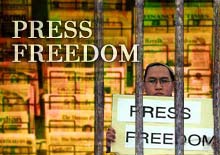
Washington (VOA) - A media watchdog group says it is “alarmed” at the increasing attacks against journalists and press freedoms in West Africa.
The Media Foundation of West Africa recorded 168 violations in 2006, compared to 148 in 2005. Nigeria tops the list with 32 reported cases of abuse of press freedom, followed by The Gambia and Ghana.
Jeannette Quarcoopome is the spokesperson for the Media Foundation of West Africa. From Accra, she spoke to VOA English to Africa Service reporter Joe De Capua about the status of the media.
“We are quite alarmed at the state of affairs at the moment. And we think that it does not reflect the sub-region’s own direction toward increasing democracy and respect for democratic values,” she says.
Quarcoopome talks about the type of attacks journalists in West Africa are facing.
“We are seeing physical attacks on journalists as they go about performing their legitimate duties of gathering news and information. We have seen situations where journalists also have been prevented from participating in activities they consider newsworthy, so that they are physically prevented from covering press briefings, press conferences and other such newsworthy events,” she says.
She adds, “In the specific case of The Gambia (number two on the list), we have incidents of arson and continuous threats on the lives of the journalists to the extent that a number of them have fled the country. At the moment, the Media Foundation is having to support some of these journalists, who no longer feel safe in their countries.”
In Nigeria (number one), some of the violations reported include arrests and detentions.
“The third country probably would be Ghana,” she says, “where there has been increasing intolerance in the way and manner that the journalists and the media are turning the searchlight on the lives of people who hold public office, as well as individuals in general.”
Liberia, Ivory Coast and Guinea-Conakry are also high on the foundation’s list of media rights abusers.
In 2006 alone, the MFWA recorded 168 cases of violations in 15 of the 16 countries in the Sub-Region as compared to 148 attacks registered in 2005.
A press release issued by the Foundation in Accra said Nigeria topped the list with 32 cases of abuses of press freedom rights, representing 19 per cent.
The Gambia, the country with the smallest population and land size, followed with 27 cases of abuses indicating 16 per cent.
Of the remaining 67 per cent Liberia had 20; representing 12 per cent; while Ghana was fourth on the list with 18 cases, (11 per cent). Cote d'Ivoire and Niger recorded 15 cases each representing eight per cent; Guinea-Conakry followed with 11 cases, making seven per cent. Sierra Leone, Senegal and Benin followed with eight cases (five per cent), seven cases (four per cent) and six cases (three per cent. The last set of countries were Togo, three (two per cent); Mali two (one per cent), Guinea Bissau, two (one per cent), Burkina Faso one (0.5 per cent) and Mauritania one (0.5 per cent).
Cape Verde is the only country that registered no case.
An Editor was murdered in Nigeria.
The MFWA noted that this compilation might not include several possible other acts of violation that might not have been noticed, observed or reported.
It is likely that some of the areas with low cases may have been poorly monitored. Even for those where there appears to be more cases reported, not all cases may have been captured, especially if they occurred outside the capitals and cities.
Moreover, we observe that low cases do not necessarily mean less harmful violations.
More cases do not necessarily represent the cruellest violations either, except for, say, The Gambia in this instance which exhibited the worst and generally more violent repression.
Liberia's seeming many cases is not an indication necessarily of an abhorrent situation. They do not represent State policy or endorsement. They are mostly acts by errant security personnel. Also in some countries, violations are perpetrated by State actors and result from generalized or specific government policy of repression such as The Gambia.
In some, such as Ghana, violations are perpetrated by individual members of security (Police) and/or non-state actors, in violation of the legal and constitutional order.
In yet others violations are sanctioned by laws that violate the internationally accepted norms of press freedom and freedom of expression.
The Report only records violations against press freedom, and does not represent numerous other acts of attacks on free speech, or violations of other realms of freedom of expression in the Sub-Region such as academic freedom and others.
The release said the MFWA regretted the worsening media freedom, even though the constitution of every country professed to protect press freedom. The MFWA called on human rights organizations, political parties, political leaders and civil society organizations, who cherished democracy to join the MFWA and free expression advocacy organizations to intensify activities to protest against such violations.